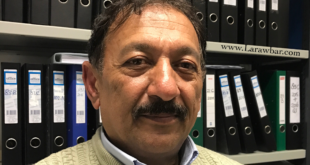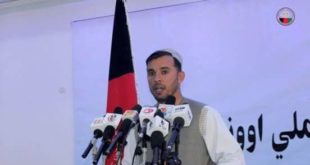Afghans have distinct ethnic physical features and are friendly, sociable, hospitable, curious, dignified and egalitarian people.Pashto – which is regarded as centuries old language by the linguists – is the predominant language in the Afghan land.
The current Afghanistan and FATA, PATA, FANA, NWFP, Attock, Mianwali and Pakhtun-belt of Balochistan having 45 percent of Pashtun population in 11 districts of Balochistan is the historical land of Afghans.
Pakhtuns have been the true followers of monotheistic religions like Judaism and Islam among the revealed religions of history and despite of being exploited by the religeous clergy in the name of religion they have stuck to the abstract ideals of monotheism,truth,social justice and respect for the institution of prophethood due to its revolutionary voice against socio-politico-economic injustice and oppression.
Afghans have always appreciated the reformative and humanitarian role of true religeous scholars so much so that the concept of “Jumaat” in Pashto which symbolises the space-time-realisation of abstract realities has become a part and parcel of Pashtun culture.
It is due to this regard that Afghan history has produced personalities like Rehman baba,Hameed baba,Abdur Raheem Popalzai,Saadullah Khan (Sartor Fakeer),Fakir Ippi,Pir Rokhan etc.
These personalities are known for embodying the true spirit of religion which was introduced to the indians of the subcontinent by Sir Mohammad Iqbal in his poetry.
Due to the geo-political importance of the historical Afghan land as a gateway to south asia all the imperialist powers whether they were Greeks, Mongols, Mughals or British tried to invade and conquer the Afghan land due to which Afghan land has since been compelled to portay the picture of battlefield between the imperialist forces and retaliatory and resilient Afghans.The result was instability in the Afghan land and in turn political turmoil in Asia.
The most vital factor in Afghan nationalism is Pukhtunwali or Afghaniyat which is in the blood of every Afghan.It is the centuries old socio-ethical code of Afghan societal nomenclature.
It is the cultural tradition of Afghan society which defines itself in the individual and collective behaviour pattern of Afghans.This code of ethics has evolved over centuries through nomadic,tribal,agrarian and now in the contemporary industrial and information age.
It is even visible in those pashtuns who have been living in Punjab,Sindh and some states of India and no more know or speak Pashto language.They still unconsciously practice the socio-ethical code of Pukhtunwali in their social relations and collective affairs.
There is no doubt that with the passage of time Pakhtuns living in Pakistan and India are getting affected due to indianisation and state controlled-propaganda-based education system in Pakistan which is suitable to produce good and submissive servants for the colonial legacy prevalent in Pakistan and India but it is alo a fact that despite of geo-political division of Afghans, the intrinsic and inborn love for freedom, retaliation against injustice and No to dictation present in the Afghan nature can get triggered any time which can rejuvenate the freedom loving instinct in the Pakhtuns.
Consequently they would get attracted to their common nucleus of Afghanland – a poor but proud land which has passed the test of time in the most critical moments of its existence even when it was sandwitched between the super powers of the past namely the Persian ,Russian,Mongol and Indian empires.
The contemporary Afghanistan is the remenisance of the glorius Durrani Dynasty of Ahmed Shah baba – the empire which was second in size only to the Ottoman Empire.
It can still serve as a source of inspiration for the Pakhtuns to re-attain their past glory in the form of a bright future after getting over the gloomy present in which they are being used to kill their fellow Afghan brothers, to safeguard their non-Afghan enemies,to serve a geographical territory which is destined to change again due to the unjust ,brutal and anti-Pashtun policies of the ruling junta and lack of sincere efforts to give due rights to the people of all nationalities.
Afghans possess a national language spoken by the majority,common religion practiced by the majority,thousands of years old glorious past,resilient and freedom loving nature and Pakhtunwali/Afghaniyat as their socio-ethical code of life.
Pashtuns of Pakistan are wasting their energies to venerate and defend fake political figures,fabricated parties,fascist movements,dying institutions and adhoc constitution despite of the fact that they constitute an integral part of Afghan nation – a nation which is concentrated in Afghanistan,a power to reckon with in Pakistan and visibly present in India.
Under the current political circumstances it seems difficult if not impossible but history is witness to the fact that despite of reverence and contrary to one’s wishes geographical boundries keep on changing.
The current inhabitants of Pakistan except Pakhtuns were all indians before 1947 and they became Pakistanis overnight.The current bengalis were all Pakistanis before the formation of Bengla Desh but now they are Bengalis.
The experiment of dividing countries and lands on the basis of religion has proved wrong times and again and has lost its meaning in the contemporary world.
This is the age of Nationalism.States are being created and disintegrated based on the idea of Nationalism. Language, Land, Ethnicity and social code of ethics are defining new nation states though factors like religion, economy, natural resources, geo-strategic position and interests of the super powers are also important especially in strengthening and weakening of a nation.
It might sound like a dream but it will be difficult for the “lar aw bar” Afghans (meaning Afghans across the durand line) to remain divided for long as the forces of history will ultimately combine them into a common land so that the region is segmented into its natural and historic nations after which peace and stability of Asia in general and south asia in particular will be ensured.
This unification of “lar aw bar” Afghans will turn out to be the formation of Loy Afghanistan comprising of its lost Pakhtun land (currently under the geographical jurisdiction of Pakistan) and based on the tenets of Pukhtunwali – the centuries old socio-moral code of Afghans.
— ———–
 لراوبر ویب پاڼه لراوبر يو افغان – تازه خبرونه
لراوبر ویب پاڼه لراوبر يو افغان – تازه خبرونه



